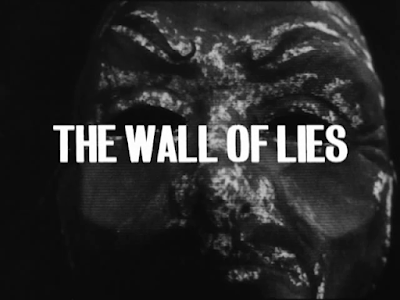Saturday 4th April 1964 - Assassin at Peking
"But what is the truth? I wonder where they are now? The past or the future?"
It's all a little hectic and rushed.
Bah! The sword fight between Tegana and Ian which looked like it would happen at the end of last episode is broken up by the arrival of Ling-Tau and the Khan's soldiers. We have to wait to the end of this episode to see a fight between Tegana and Marco Polo.
It's the role of the Doctor that is interesting in this episode. We see him being manipulative and cunning but without any of the sinister, malicious edge evident in earlier stories - or even the bad-temper he showed at the start of this adventure. When he loses the game of backgammon to the Khan he is sanguine about the loss of the TARDIS and accepts defeat with a smile (I wonder, too, whether he allowed the Khan to beat him - or, alternatively, that the Khan allowed the Doctor to amount sizeable winnings in order to legitimately win the TARDIS from him). The Khan is a useful character as he displays many of the Doctor's qualities. I like the Khan a great deal: he has a sense of humour, intelligence and much self-knowledge. His cheerful reply to Polo's apology for giving the Doctor they key to the TARDIS at the end - "If you hadn't, the old man would have won it at backgammon" - shows his wisdom and grace which was distinct from his declarations about "humbling" his enemies.
This final episode is a rushed series of scenes that cover old ground - Tegana's treachery, Polo's longing to go home, Polo's trust in the Doctor and his companions, Ping-Chu's enforced marriage - that are brought to a climax in the assassination attempt on the Khan (the first we have heard of this plan) and the duel between Tegana and Polo. In the confusion at the end, the companions escape in the TARDIS.
There's an odd, caustic humour evident in this episode shown especially in the scene where the Khan tells Ping-Chu: "Your beloved husband-to-be, so anxious to be worthy of your love, drank a potion of quicksilver and sulphur, the elixir of life and eternal youth, and expired." For Ping-Chu's situation to be resolved off-screen so suddenly probably has more to do with the realisation the writer had that there was no more time in which to properly resolve this story thread.
I 've mixed feelings about this story and happy to be moving on to a new adventure. While there are scenes that I like, I haven't enjoyed it as a whole adventure. Maybe seven episodes is too long. My opinion hasn't been helped by watching the episodes as Loose Cannon reconstructions. Loose Cannon have done a marvellous job with recreating episodes out of photos and audio - seen especially in the reconstruction of the sword fight between Tegana and Polo - but I feel that the strengths of this story were in the sets and costumes plus the epic sense of journey across a vast distance. I'm reading the Target novelisation of Marco Polo at the moment and I'm enjoying that mode of experiencing this adventure far more. I'm more than willing to accept that I'm just wrong about this.
Marco Polo has been held in high esteem by long-time fans of the show. John Peel described it as "Gorgeous, fast, tense, funny and filled with character and feel for the period - Marco Polo is one of the true classics of television."
Next episode: The Sea of Death.















